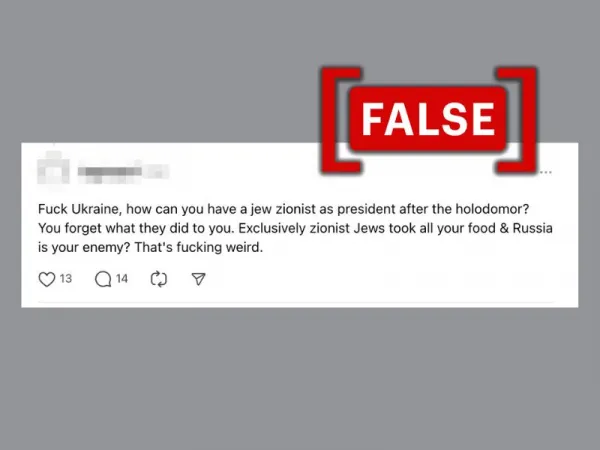By: Iryna Hnatiuk
June 25 2024
 A screenshot of a post on Threads falsely claiming Holodomor in Ukraine was organized by Jews. (Source: Threads/Screenshot/Modified by Logically Facts)
A screenshot of a post on Threads falsely claiming Holodomor in Ukraine was organized by Jews. (Source: Threads/Screenshot/Modified by Logically Facts)
Holodomor, the extermination of Ukrainian people that took place in 1932-1933, was organized by Stalin's Soviet regime, not by Jews.
Discussion is unfolding on social media about the nature of the Holodomor — the extermination of Ukrainian people that took place in 1932-1933, resulting in millions of deaths. The author of the post (archived here) rhetorically asks how Ukrainians can accept a Jewish president if "zionist Jews" organized the Holodomor in Ukraine.
This claim is entirely false. Holodomor ("death inflicted by starvation" in Ukrainian) — a deliberate extermination of the Ukrainian population through induced famine — was organized by Stalin's Soviet regime. The Jewish people had no involvement in this historical event.
Context
In 1932 and 1933, millions of Ukrainians were killed in the Holodomor, a man-made famine engineered by the Soviet government of Joseph Stalin. The primary victims of the Holodomor were rural farmers and villagers, who made up roughly 80 percent of Ukraine's population in the 1930s. The demographic research from the Ukrainian Research Institute at Harvard University estimates the death toll at 3.9 million.
Timothy Snyder, an American historian specializing in the history of Central and Eastern Europe, the Soviet Union, and the Holocaust, wrote in his book "Bloodlands: Europe Between Hitler and Stalin" that the actual figure is approximately 3.3 million deaths to starvation and disease related to the starvation in Ukraine from 1932 to 1933.
Historians agree that the precise number will never be known.
In fact
In a joint statement on the 90th anniversary of the Holodomor of 1932 –1933 on December 1, 2023, in Skopje, OCSE Ambassador Michael R. Carpenter stated the following: "For decades, the Holodomor—an appalling act of inhumanity—was suppressed and denied by the Soviet Union. Today, there are ongoing attempts by the Russian Federation to glorify Stalinism and deny the Holodomor and other atrocities committed by the communist regime, including through the persecution of all those individuals and organizations who have sought to expose such Soviet-era atrocities. We express our grave concern about the repetition of the unconscionable actions of the past."
The research, "MAPA: Digital Atlas of Ukraine," provided by the members of the Harvard Ukrainian Research Institute's project, points to Soviet government policies in Ukraine that were driven not only by the determination to crush the Ukrainian political and cultural revival of the 1920s but also by the determination to arrest the development of the Ukrainian nation.
According to the Holodomor Research of the Canadian Institute of Ukrainian Studies of the University of Alberta, in 1932, the Communist Party set impossibly high quotas for the amount of grain Ukrainian villages were required to contribute to the Soviet state. When the villages could not meet the quotas, authorities intensified the requisition campaign, confiscating meat and potatoes. Special teams were sent to search homes.
Starving farmers attempted to leave their villages in search of food, but Soviet authorities issued a decree forbidding Ukraine's peasants from leaving the country. Farms, villages, and whole towns were placed on blacklists. As a result, thousands of farmers who had managed to leave their villages were apprehended and sent back. A law was introduced that made the theft of a few stalks of grain an act of sabotage punishable by execution. Soldiers were sometimes posted in watchtowers to prevent people from taking any of the harvest.
Several countries have recognized the events of 1932-1933 as genocide. The European Parliament recognized the Holodomor as a crime against humanity in 2008. In December 2022, the European Parliament adopted a resolution recognizing the Holodomor as genocide.
Raphael Lemkin, an expert in international criminal law with a particular interest in the prevention of mass human extermination, who coined and promoted the term "genocide," identified the Holodomor as "a classic example of Soviet genocide."
By the beginning of the 1930s, there was a large group of agrarian Jews living in southern Ukraine. Many of them died during Holodomor, but there are no historical facts to support the claim that Jews were on the other side of the events — among organizers of the famine.
Nicole Loroff, Jordan Vincent, and Valentina Kuryliw, in their joint work "Holodomor – Denial and Silences" for Holodomor Research Educational Consortium, wrote, "Soviet foreign minister, Maxim Litvinov, publicly denied the existence of Famine in the USSR in 1933. Discussion of the Famine or its causes was forbidden in the Soviet press, and once the Famine was over, no references were made to it in Soviet historical accounts. Moreover, citizens of the USSR were forced into silence on this issue for over half a century. By camouflaging the extent of the Ukrainian Famine as just 'food difficulties,' Soviet authorities mixed small amounts of truth into their denial, thus making it more difficult to figure out what was happening."
Until now, Holodomor has not been recognized by Russia. This claim distorts historical events and is rooted in antisemitism, along with Russia's denial of the event.
The verdict
The Holodomor in Ukraine was an act of deliberate extermination of people by creating an artificial famine. It was organized by Stalin's Soviet regime, not by "zionist Jews." Consequently, we have marked the claim and the post as false.